#citation needed podcast
Text
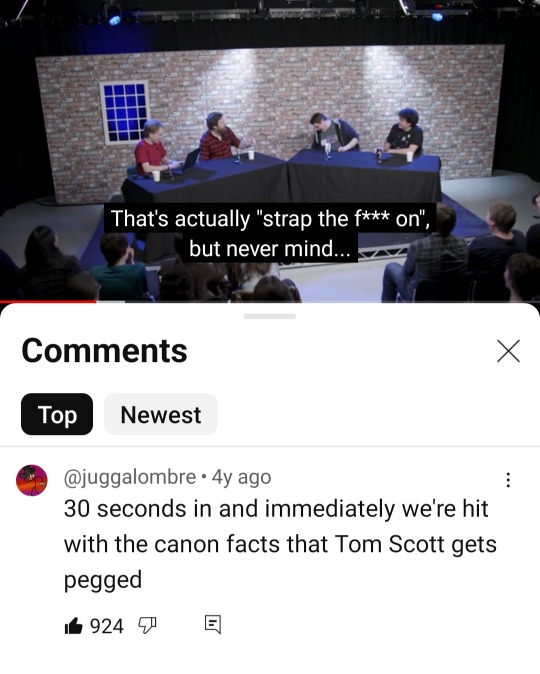
Maybe one day I'll get over the fact that this is a real YouTube comment that isn't even an exaggeration. Maybe. Probably not, though
[Image description: A screenshot of a tech diff video and a comment below it. The video is one of the Citation Needed episodes filmed live in YouTube Space. The captions read "That's actually "strap the f*** on", but never mind..." Below the video, a comment by @juggalombre reads "30 seconds in and immediately we're hit with the canon facts that Tom Scott gets pegged"]
#tech dif#tech diff#the technical difficulties#mattgrayspenis#citation needed#citation needed podcast#tom scott
61 notes
·
View notes
Text
Another great thing I love about red valley is that it forces you to come to terms with some uncomfortable questions about capitalism and the prison system. Highly recommend "Are prisons obsolete" by Angela Davis (which is by now a classic on the subject and more relvant to the US, still) but the point rv makes isn't outwardly Does the system work? (it doesn't) but mostly: Are my actions justified because I consider the people I'm acting upon worthless and evil?
Gordon says the first experiments were done on homeless people (which then begets the question: why are homeless people considered subhuman?), then they moved to convicts (and the occasional scientist lol) but Aubrey herself says she could excuse what they were doing because of that reason (can't find the exact episode, but you get what I mean). Then you learn that Warren also killed someone and he doesn't remember it, but he did it, and you know he did, Everyone knows he did. And you as the audience have to make a choice: did he deserve it? You know he's nice, a bit of a nutcase, but he's a nerd passionate about retro-gaming, you like him. Would your reaction to knowing he's a murder have changed if you didn't like him? Would he still deserve it? Would Pooh, or Yogi, or any person of the previous cohorts?
The point rv makes also is: there will be a line that your own human empathy cannot cross. You cannot say rapists and murderers don't deserve to be "punished", or that they should roam free as if nothing happened, but it forces you to consider what would you do. How do you solve this problem? After all, it's not like Overhead went and abducted these convicts; the prisons gave them full access, allowed them to take them to some undisclosed location and have their merry way with them, which means that to some degree human testing was considered and given the OK by the governement. Which means that the system doesn't work.
And then comes in the fact of the power imbalance, the social dynamic that rich people are going to be rich people, forever. Bryony obviously doesn't care about fame or whatever, she's obsessively dedicated to her research, but Clive, the board of Overhead, to a degree even Grace and Pamela- they care about their image, they Want to look good, they Want to provide the next new shiny toy millionaires and billionaires are going to play with, and they don't care what the path that leads to it entails, they care about money, about funding, about polishing something that works and grants them Eternal Life (hence the catchphrase, hence the need to make Warren presentable).
Gordon also says something like: when you start cannibalising your own staff, where does that lead you? Rich people don't care! As long as they can benefit from something they're willing to put anyone through the wringer: homeless people, convicts, loose-mouthed scientists, they don't care!
It's not about empathy, you're never going to empathise with a rapist, and it's not about The Greater Good, it's about capital, and how many human lives are rich people willing to sacrifice to save a dime.
#red valley podcast#red valley spoilers#(loosely)#its not very well worded but im barely awake i just needed to say it and leave it be#would love to provide citations and quotes my academy heart would sing but 1 am lazy 2 am sleepy#red valley#ask to tag#also of course it's not black and white and by this i dont mean that rich people shouldn't be Dealt With because they should#but that crimes dont exist in a vacuum etcetera etcetera
66 notes
·
View notes
Text
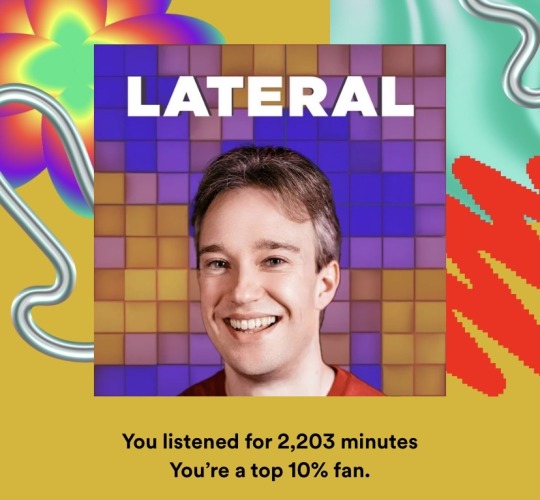
normal people behaviour
#how is that only top 10%#this just feels a bit excessive#plus i listened to all of the old citation needed podcast too…#tom scott#tscott
21 notes
·
View notes
Text
My recommendation to you all for this week is this episode from the podcast Citations Needed about how the "human shields" argument is used by western media to create a double standard by which Israeli soldiers can kill Palestinian civilians and absolve themselves of responsibility for those civilian deaths. The episode explains how this line of propaganda has also been used during the Vietnam war and in other colonial contexts, and builds what I think is some really incisive commentary on how International Law can be used uphold colonial frameworks.
7 notes
·
View notes
Text
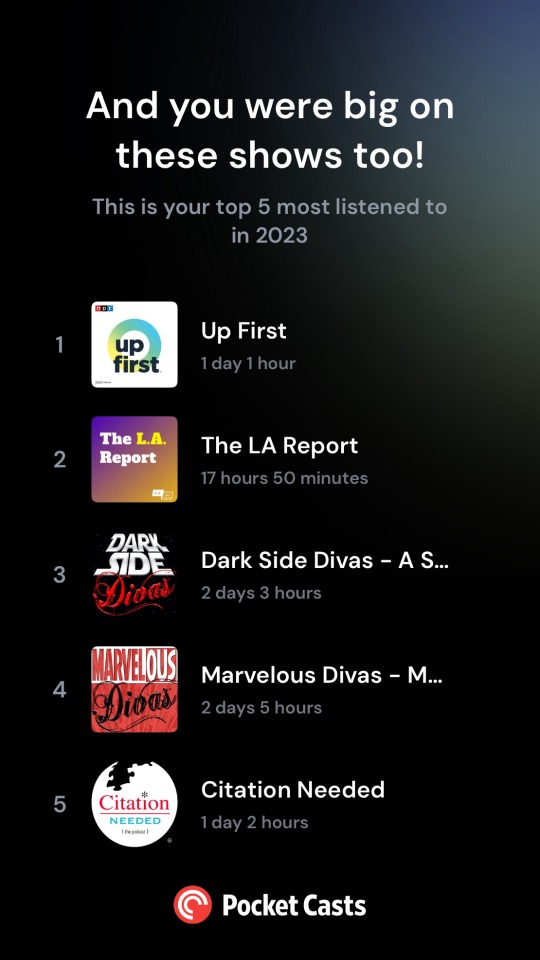
My top podcasts of the year!
#pocketcasts#playback2023#pocket casts#npr#up first#laist#the la report#star wars#dark side divas#marvel#mcu#marvelous divas#citation needed#podcast#2023
2 notes
·
View notes
Text
Citations Needed | January 25, 2023
These episodes, mostly from the 1980s and ’90s, have become a cultural punchline, something amusing and mocked but ultimately, one would think, harmless. But what most viewers don’t know is that many of these episodes were not just part of a teen-oriented convention turned TV trope; a number of them were actually funded by the federal government to the tune of hundreds of thousands — sometimes millions — of dollars to promote so-called “drug awareness.”
#citations needed#drug war#90s television#podcasts#media#this is the legacy of operation mockingbird#operation mockingbird#deep research
4 notes
·
View notes
Text
29/04/24: reblogs have been turned off for a few days. Check replies.
17/12/23 this masterlist has been completely, vetted, revamped and reformatted with free access to all reading and viewing material. It will be updated and edited periodically so please try and reblog the original post if you're able.
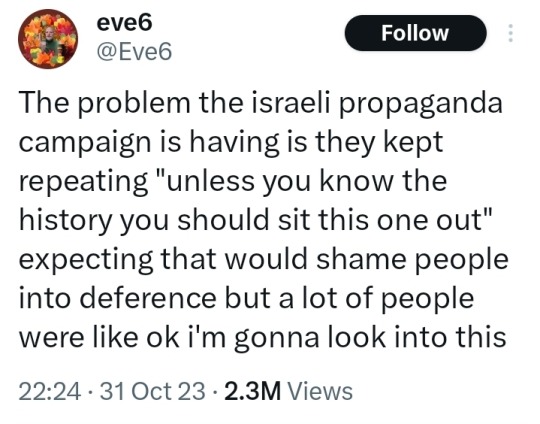
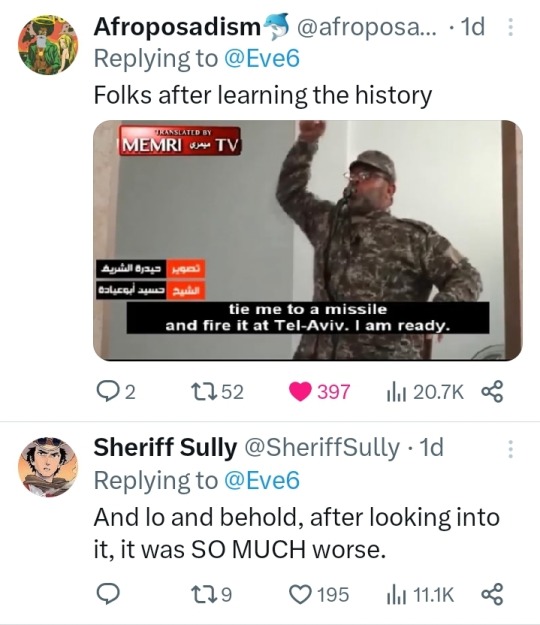

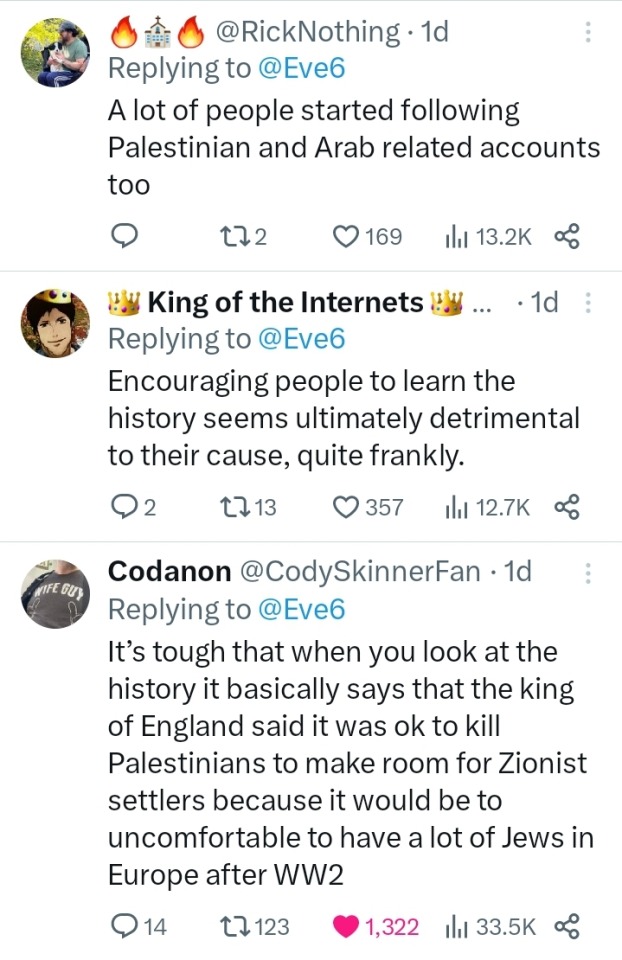
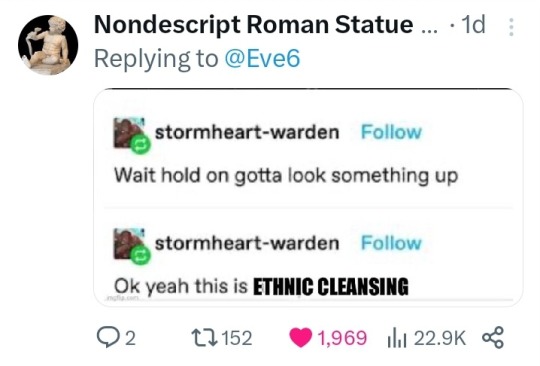
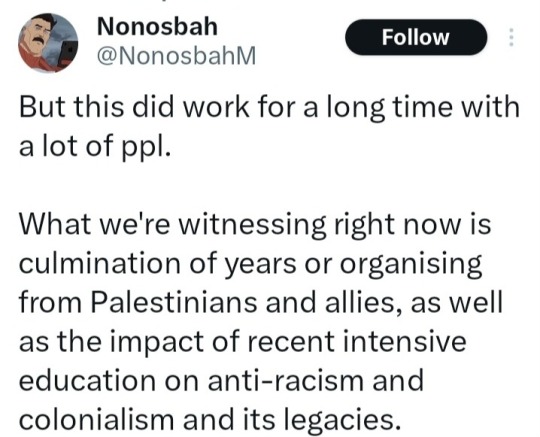
The Big Damn List Of Stuff They Said You Didn't Know
(Yes, it's a lot. Just choose your preferred medium and then pick one.)
Podcasts
Backgrounders and Quick Facts
Interactive Maps
Teach-Out Resources
Reading Material (free)
Films and Documentaries (free)
Non-Governmental Organizations
Social Media
How You Can Help
Podcasts
Cocktails & Capitalism: The Story of Palestine Part 1, Part 3
It Could Happen Here: The Cheapest Land is Bought with Blood, Part 2, The Balfour Declaration
Citations Needed: Media narratives and consent manufacturing around Israel-Palestine and the Gaza Siege
The Deprogram: Free Palestine, ft. decolonizatepalestine.com.
Backgrounders and Quick Facts
The Palestine Academy: Palestine 101
Institute for Middle East Understanding: Explainers and Quick Facts
Interactive Maps
Visualizing Palestine
Teach-Out Resources
1) Cambridge UCU and Pal Society
Palestine 101
Intro to Palestine Film + Art + Literature
Resources for Organising and Facilitating)
2) The Jadaliya YouTube Channel of the Arab Studies Institute
Gaza in Context Teach-in series
War on Palestine podcast
Updates and Discussions of news with co-editors Noura Erakat and Mouin Rabbani.
3) The Palestine Directory
History (virtual tours, digital archives, The Palestine Oral History Project, Documenting Palestine, Queering Palestine)
Cultural History (Palestine Open Maps, Overdue Books Zine, Palestine Poster Project)
Contemporary Voices in the Arts
Get Involved: NGOs and campaigns to help and support.
3) PalQuest Interactive Encyclopedia of the Palestine Question.
4) The Palestine Remix by Al Jazeera
Books and Articles
Free reading material
My Gdrive of Palestine/Decolonization Literature (nearly all the books recommended below + books from other recommended lists)
Five free eBooks by Verso
Three Free eBooks on Palestine by Haymarket
LGBT Activist Scott Long's Google Drive of Palestine Freedom Struggle Resources
Recommended Reading List
Academic Books
Edward Said (1979) The Question of Palestine, Random House
Ilan Pappé (2002)(ed) The Israel/Palestine Question, Routledge
Ilan Pappé (2006) The Ethnic Cleansing of Palestine, OneWorld Publications
Ilan Pappé (2011) The Forgotten Palestinians: A History of the Palestinians in Israel, Yale University Press
Ilan Pappé (2015) The Idea of Israel: A History of Power and Knowledge, Verso Books
Ilan Pappé (2017) The Biggest Prison On Earth: A History Of The Occupied Territories, OneWorld Publications
Ilan Pappé (2022) A History of Modern Palestine, Cambridge University Press
Rosemary Sayigh (2007) The Palestinians: From Peasants to Revolutionaries, Bloomsbury
Andrew Ross (2019) Stone Men: the Palestinians who Built Israel, Verso Books
Rashid Khalidi (2020) The Hundred Years’ War on Palestine: A History of Settler Colonialism and Resistance 1917–2017
Ariella Azoulay (2011) From Palestine to Israel: A Photographic Record of Destruction and State Formation, 1947-1950, Pluto Press
Ariella Azoulay and Adi Ophir (2012) The One-State Condition: Occupation and Democracy in Israel/Palestine, Stanford University Press.
Jeff Halper (2010) An Israeli in Palestine: Resisting Dispossession, Redeeming Israel, Pluto Press
Jeff Halper (2015) War Against the People: Israel, the Palestinians and Global Pacification
Jeff Halper (2021) Decolonizing Israel, Liberating Palestine: Zionism, Settler Colonialism, and the Case for One Democratic State, Pluto Press
Anthony Loewenstein (2023) The Palestine Laboratory: How Israel exports the Technology of Occupation around the World
Noura Erakat (2019) Justice for Some: Law and the Question of Palestine, Stanford University Press
Neve Gordon (2008) Israel’s Occupation, University of California Press
Joseph Massad (2006) The Persistence of the Palestinian Question: Essays on Zionism and the Palestinians, Routledge
Memoirs
Edward Said (1986) After the Last Sky: Palestine Lives, Columbia University PEdward Saidress
Edward Said (2000) Out of Place; A Memoir, First Vintage Books
Mourid Barghouti (2005) I saw Ramallah, Bloomsbury
Hatim Kanaaneh (2008) A Doctor in Galilee: The Life and Struggle of a Palestinian in Israel, Pluto Press
Raja Shehadeh (2008) Palestinian Walks: Into a Vanishing Landscape, Profile Books
Ghada Karmi (2009) In Search of Fatima: A Palestinian Story, Verso Books
Vittorio Arrigoni (2010) Gaza Stay Human, Kube Publishing
Ramzy Baroud (2010) My Father Was a Freedom Fighter: Gaza's Untold Story, Pluto Press
Izzeldin Abuelaish (2011) I Shall Not Hate: A Gaza Doctor’s Journey on the Road to Peace and Human Dignity, Bloomsbury
Atef Abu Saif (2015) The Drone Eats with Me: A Gaza Diary, Beacon Press
Anthologies
Voices from Gaza - Insaniyyat (The Society of Palestinian Anthropologists)
Letters From Gaza • Protean Magazine
Salma Khadra Jayyusi (1992) Anthology of Modern Palestinian Literature, Columbia University Press
ASHTAR Theatre (2010) The Gaza Monologues
Refaat Alreer (ed) (2014) Gaza Writes Back, Just World Books
Refaat Alreer, Laila El-Haddad (eds) (2015) Gaza Unsilenced, Just World Books
Cate Malek and Mateo Hoke (eds)(2015) Palestine Speaks: Narrative of Life under Occupation, Verso Books
Jehad Abusalim, Jennifer Bing (eds) (2022) Light in Gaza: Writings Born of Fire, Haymarket Books
Short Story Collections
Ghassan Kanafani, Hilary Kilpatrick (trans) (1968) Men in the Sun and Other Palestinian Stories, Lynne Rienner Publishers
Ghassan Kanafani, Barbara Harlow, Karen E. Riley (trans) (2000) Palestine’s Children: Returning to Haifa and Other Stories, Lynne Rienner Publishers
Atef Abu Saif (2014) The Book of Gaza: A City in Short Fiction, Comma Press
Samira Azzam, Ranya Abdelrahman (trans) (2022) Out Of Time: The Collected Short Stories of Samira Azzam
Sonia Sulaiman (2023) Muneera and the Moon; Stories Inspired by Palestinian Folklore
Essay Collections
Edward W. Said (2000) Reflections on Exile and Other Essays, Harvard University Press
Salim Tamari (2008) Mountain against the Sea: Essays on Palestinian Society and Culture, University of California Press
Fatma Kassem (2011) Palestinian Women: Narratives, histories and gendered memory, Bloombsbury
Ramzy Baroud (2019) These Chains Will Be Broken: Palestinian Stories of Struggle and Defiance in Israeli Prisons, Clarity Press
Novels
Sahar Khalifeh (1976) Wild Thorns, Saqi Books
Liyana Badr (1993) A Balcony over the Fakihani, Interlink Books
Hala Alyan (2017) Salt Houses, Harper Books
Susan Abulhawa (2011) Mornings in Jenin, Bloomsbury
Susan Abulhawa (2020) Against the Loveless World, Bloomsbury
Graphic novels
Joe Sacco (2001) Palestine
Joe Sacco (2010) Footnotes in Gaza
Naji al-Ali (2009) A Child in Palestine, Verso Books
Mohammad Sabaaneh (2021) Power Born of Dreams: My Story is Palestine, Street Noise Book*
Poetry
Fady Joudah (2008) The Earth in the Attic, Sheridan Books,
Ghassan Zaqtan, Fady Joudah (trans) (2012) Like a Straw Bird It Follows Me and Other Poems, Yale University Press
Hala Alyan (2013) Atrium: Poems, Three Rooms Press*
Mohammed El-Kurd (2021) Rifqa, Haymarket Books
Mosab Abu Toha (2022) Things You May Find Hidden in My Ear: Poems from Gaza, City Lights Publishers
Tawfiq Zayyad (2023) We Are Here to Stay, Smokestack Books*
The Works of Mahmoud Darwish
Poems
Rafeef Ziadah (2011) We Teach Life, Sir
Nasser Rabah (2022) In the Endless War
Refaat Alareer (2011) If I Must Die
Hiba Abu Nada (2023) I Grant You Refuge/ Not Just Passing
[All books except the ones starred are available in my gdrive. I'm adding more each day. But please try and buy whatever you're able or borrow from the library. Most should be available in the discounted Free Palestine Reading List by Pluto Press, Verso and Haymarket Books.]
Human Rights Reports & Documents
Information on current International Court of Justice case on ‘Legal Consequences arising from the Policies and Practices of Israel in the Occupied Palestinian Territory, including East Jerusalem’
UN Commission of Inquiry Report 2022
UN Special Rapporteur Report on Apartheid 2022
Amnesty International Report on Apartheid 2022
Human Rights Watch Report on Apartheid 2021
Report of the United Nations Fact-Finding Mission on the Gaza Conflict’ 2009 (‘The Goldstone Report’)
Advisory Opinion on the Legal Consequences of the Construction of a Wall in the Occupied Palestinian Territory, International Court of Justice, 9 July 2004
Films
Documentaries
Jenin, Jenin (2003) dir. Mohammed Bakri
Massacre (2005) dir. Monica Borgmann, Lokman Slim, Hermann Theissen
Slingshot HipHop (2008) dir. Jackie Reem Salloum
Waltz with Bashir (2008) dir. Ari Folman † (also on Amazon Prime)
Tears of Gaza (2010) dir. Vibeke Løkkeberg (also on Amazon Prime)
5 Broken Cameras (2011) dir. Emad Burnat (also on Amazon Prime)
The Gatekeepers (2012) dir. Dror Moreh (also on Amazon Prime)
The Great Book Robbery (2012) | Al Jazeera English
Al Nakba (2013) | Al Jazeera (5-episode docu-series)
The Village Under the Forest (2013) dir. Mark J. Kaplan
Where Should The Birds Fly (2013) dir. Fida Qishta
Naila and the Uprising (2017) (also on Amazon Prime)
GAZA (2019) dir. Andrew McConnell and Garry Keane
Gaza Fights For Freedom (2019) dir. Abby Martin
Little Palestine: Diary Of A Siege (2021) dir. Abdallah Al Khatib
Palestine 1920: The Other Side of the Palestinian Story (2021) | Al Jazeera World Documentary
Gaza Fights Back (2021) | MintPress News Original Documentary | dir. Dan Cohen
Innocence (2022) dir. Guy Davidi
Short Films
Fatenah (2009) dir. Ahmad Habash
Gaza-London (2009) dir. Dina Hamdan
Condom Lead (2013) dir. Tarzan Nasser, Arab Nasser
OBAIDA (2019) | Defence for Children Palestine
Theatrical Films
Divine Intervention (2002) | dir. Elia Suleiman (also on Netflix)
Paradise Now (2005) dir Hany Abu-Assad (also on Amazon Prime)
Lemon Tree (2008) (choose auto translate for English subs) (also on Amazon Prime)
It Must Be Heaven (2009) | dir. Elia Suleiman †
The Promise (2010) mini-series dir. Peter Kosminsky (Part 1, Part 2, Part 3, Part 4)
Habibi (2011)* dir. Susan Youssef
Omar (2013)* dir. Hany Abu-Assad †
3000 Nights (2015)* dir. Mai Masri
Foxtrot (2017) dir. Samuel Maoz (also on Amazon Prime)
The Time that Remains (2019) dir. Elia Suleiman †
Gaza Mon Amour (2020) dir. Tarzan Nasser, Arab Nasser †
The Viewing Booth (2020) dir. Ra'anan Alexandrowicz (on Amazon Prime and Apple TV)
Farha (2021)* | dir. Darin J. Sallam
Palestine Film Institute Archive
All links are for free viewing. The ones marked with a star (*) can be found on Netflix, while the ones marked † can be downloaded for free from my Mega account.
If you find Guy Davidi's Innocence anywhere please let me know, I can't find it for streaming or download even to rent or buy.
In 2018, BDS urged Netflix to dump Fauda, a series created by former members of IOF death squads that legitimizes and promotes racist violence and war crimes, to no avail. Please warn others to not give this series any views. BDS has not called for a boycott of Netflix. ]
Planning to link two separate posts here listing all the books in my drive and all the films I couldn't include here. Check back for updates.
NGOs
The Boycott, Divestment, Sanctions (BDS) Movement
Medical Aid for Palestinians
Euro-Mediterranean Human Rights Monitor
Palestine Defence for Children International
Palestinian Feminist Collective
Al-Shabaka: The Palestinian Policy Network
Addameer Prisoner Support and Human Rights Association
Institute for Palestine Studies
Al Haq
Artists for Palestine
The Palestine Museum
Jewish Currents
B’Tselem
DAWN
Social Media
Palestnians on Tumblr
@el-shab-hussein
@killyfromblame
@apollos-olives
@fairuzfan
@palipunk
@sar-soor
@nabulsi
@ibtisams
@wearenotjustnumbers2
@90-ghost (is in Gaza right now. Please donate to his GFM and boost it.)
@tamarrud
Allies and advocates (not Palestinian)
@bloglikeanegyptian beautiful posts that read like op-eds
@vyorei daily news roundups
@luthienne resistance through prose
@decolonize-the-left scoop on the US political plans and impacts
@feluka
(Please don't expect any of these blogs to be completely devoted to Palestine allyship; they do post regularly about it but they're still personal blogs and post whatever else they feel like. Do not harrass them.)
Gaza journalists
Motaz Azaiza IG: @motaz_azaiza | Twitter: @azaizamotaz9 | TikTok: _motaz.azaiza (left Gaza as of Jan 23)
Bisan Owda IG and TikTok: wizard_bisan1 | Twitter: @wizardbisan
Saleh Aljafarawi IG: @saleh_aljafarawi | Twitter: @S_Aljafarawi | TikTok: @saleh_aljafarawi97
Plestia Alaqad IG: @byplestia | TikTok: @plestiaaqad (left Gaza)
Wael Al-Dahdouh IG: @wael_eldahdouh | Twitter: @WaelDahdouh (left Gaza as of Jan 13)
Hind Khoudary IG: @hindkhoudary | Twitter: @Hind_Gaza
Ismail Jood IG and TikTok: @ismail.jood (announced end of coverage on Jan 25)
Yara Eid IG: @eid_yara | Twitter: @yaraeid_
Eye on Palestine IG: @eye.on.palestine | Twitter: @EyeonPalestine | TikTok: @eyes.on.palestine
Muhammad Shehada Twitter: @muhammadshehad2
(Edit: even though some journos have evacuated, the footage up to the end of their reporting is up on their social media, and they're also doing urgent fundraisers to get their families and friends to safety. Please donate or share their posts.)
News organisations
The Electronic Intifada Twitter: @intifada | IG: @electronicintifada
Quds News Network Twitter and Telegram: @QudsNen | IG: @qudsn (Arabic)
Times of Gaza IG: @timesofgaza | Twitter: @Timesofgaza | Telegram: @TIMESOFGAZA
The Palestine Chronicle Twitter: @PalestineChron | IG: @palestinechron | @palestinechronicle
Al-Jazeera Twitter: @AJEnglish | IG and TikTok: @aljazeeraenglish, @ajplus
Middle East Eye IG and TikTok: @middleeasteye | Twitter: @MiddleEastEye
Democracy Now Twitter and IG: @democracynow TikTok: @democracynow.org
Haaretz* Twitter: @Haaretz | IG: haaretzcom
Mondoweiss IG and TikTok: @mondoweiss | Twitter: @Mondoweiss
The Intercept Twitter and IG: @theintercept
MintPress Twitter: @MintPressNews | IG: mintpress
Novara Media Twitter and IG: @novaramedia
Truthout Twitter and IG: @truthout
[*Please note that Haaretz is an Israeli Liberal Zionist newspaper and heavily propagandized against Palestine. It's included here only as a Zionist critic of the Israeli government and IDF from within Israel.]
Palestnians on Other Social Media
Mouin Rabbani: Middle East analyst specializing in the Arab-Israeli conflict and Palestinian affairs. Twitter: @MouinRabbani
Noura Erakat: Legal scholar, human rights attorney, specialising in Israeli–Palestinian conflict. Twitter: @4noura | IG: @nouraerakat | (http://www.nouraerakat.com/)
Hebh Jamal: Journalist in Germany. IG and Twitter: @hebh_jamal
Ghada Sasa: PhD candidate in International Relations, green colonialism, and Islam in Canada. Twitter: @sasa_ghada | IG: @ghadasasa48
Taleed El Sabawi: Assistant professor of law and researcher in public health. Twitter: @el_sabawi | IG
Lexi Alexander: Filmmaker and activist. Twitter: @LexiAlex | IG: @lexialexander1
Mariam Barghouti: Writer, blogger, researcher, and journalist. Twitter: @MariamBarghouti | IG: @mariambarghouti
Rasha Abdulhadi: Queer poet, author and cultural organizer. Twitter: @rashaabdulhadi
Mohammed el-Kurd: Writer and activist from Jerusalem. IG: @mohammedelkurd | Twitter: @m7mdkurd
Ramy Abdu: Founder and Chairman of the Euro-Mediterranean Human Rights Monitor. Twitter: @RamyAbdu
Subhi: Founder of The Palestine Academy website. IG: @sbeih.jpg |TikTok @iamsbeih | Twitter: @iamsbeih
Allies
Lowkey (Kareem Dennis): Rapper, activist, video and podcast host for MintPress. Twitter: @LowkeyOnline IG: @lowkeyonline
Francesca Albanese: UN Special Rapporteur on the Occupied Territories. Twitter: @FranceskAlbs
Sana Saeed: Journalist and media critic, host and senior producer at Al-Jazeera Plus. IG: @sanaface | Twitter: @SanaSaeed
Shailja Patel: Poet, playwright, activist, founding member of Kenyans For Peace, Truth and Justice. Twitter: @shailjapatel
Jairo I. Fúnez-Flores: Researcher in curriculum studies, decolonial theory, social movements. Twitter: @Jairo_I_Funez
Jack Dodson: Journalist and Filmmaker. Twitter: @JackDodson IG: @jdodson4
Imani Barbarin: Writer, public speaker, and disability rights activist. IG: @crutches_and_spice | Twitter: @Imani_Barbarin | TikTok: @crutches_and_spice
Jewish Allies
Katie Halper: US comedian, writer, filmmaker, podcaster, and political commentator. IG and Twitter: @kthalps
Amanda Gelender: Writer. Twitter: @agelender | (https://agelender.medium.com/)
Yoav Litvin: Jerusalem-born Writer and Photographer. IG and Twitter: @nookyelur | (yoavlitvin.com)
Alana Lentin: Professor of Cultural and Social Analysis at Western Sydney University. Twitter: @alanalentin
Gideon Levy: anti-Zionist Israeli journalist and activist. Twitter: @gideonle
How You Can Help Palestine
How to be an Ally 101
URGENT‼️📢: Global Strike Guide
If any links are broken let me know. Or pull up the current post to check whether it's fixed.
"Knowledge is Israel's worst enemy. Awareness is Israel's most hated and feared foe. That's why Israel bombs a university: it wants to kill openness and determination to refuse living under injustice and racism."
— Dr. Refaat Alareer, (martyred Dec 6, 2023)
From River To The Sea Palestine Will Be Free 🇵🇸🇵🇸🇵🇸
-----
Edit 1: took the first video down because turns out the animator is a terf and it links to her blog. Really sorry for any distress.
Edit 2: All recommended readings + Haymarket recommendations + essential decolonization texts have been uploaded to my linked gdrive. I will adding more periodically. Please do buy or check them out from the library if possible, but this post was made for and by poor and gatekept Global South bitches like me.
Some have complained about the memes being disrespectful. You're actually legally obligated to make fun of Israeli propaganda and Zionists. I don't make the rules.
Edit 3: "The river to the sea" does not mean the expulsion of Jews from Palestine. Believing that is genocide apologia.
Edit 4: Gazans have specifically asked us to put every effort into pushing for a ceasefire instead of donations. "Raising humanitarian aid" is a grift Western governments are pushing right now to deflect from the fact that they're sending billions to Israel to keep carpet bombing Gazans. As long as the blockades are still in place there will never be enough aid for two million people. (UPDATE: PLEASE DONATE to the Gazan's GoFundMe fundraisers to help them buy food and get out of Rafah into Egypt. E-SIMs, food and medical supplies are also essential. Please donate to the orgs linked in the How You Can Help. Go on the strikes. DO NOT STOP PROTESTING.)
Edit 5: Google drive link for academic books folder has been fixed. Also have added a ton of resources to all the other folders so please check them out.
Edit 6: Added interactive maps, Jadaliya channel, and masterlists of donation links and protest support and of factsheets.
The twitter accounts I reposted as it was given to me and I just now realized it had too many Israeli voices and almost none of the Palestinians I'm following, so it's being edited. Check back for more. I also removed sources like Jewish Voices of Peace and Breaking the Silence that do good work but have come under fair criticism from Palestinians.
Edit 7: Complete reformatting
Edit 8: Complete revamping of the social media section. It now reflects my own following list.
Edit 9: removed some more problematic people from the allies list. Remember that the 2SS is a grift that's used to normalize violence and occupation, kids. Supporting the one-state solution is lowest possible bar for allyship. It's "Free Palestine" not "Free half of Palestine and hope Israel doesn't go right back to killing them".
Edit 10: added The Palestine Directory + Al Jazeera documentary + Addameer. This "100 links per post" thing sucks.
Edit 11: more documentaries and films
Edit 12: reformatted reading list
Edit 13: had to remove @palipunk's masterlist to add another podcast. It's their pinned post and has more resources Palestinian culture and crafts if you want to check it out
#free palestine#palestine resources#palestine reading list#decolonization#israel palestine conflict#israel palestine war#british empire#american imperialism#apartheid#social justice#middle east history#MENA#arab history#anti zionism#palestinian art#palestinian history#palestinian culture#palestinian genocide#al nakba#ethnic cleansing#war crimes#racism#imperialism#colonialism#british colonialism#knee of huss#ask to tag#Youtube
77K notes
·
View notes
Text
Some guides to thinking through & responding to Zionist talking points
Decolonize Palestine's list of myths and debunkings of them, including "Israel made the desert bloom," "all Jewish people are indigenous to Israel," and "Palestinians won't participate in the peace process"
Bo Forbes, "Talking Points Guide: Israel-Palestine" (2023)
Jared Sacks, "A 'Self-Hating' Jew’s Guide to Zionist Talking Points" (2014)
Palestine Institute for Public Diplomacy, "Talking points and messaging guidance for Palestinians and allies" (2023)
starbucks_red_cup on Reddit, "Some Zionist talking points and responses to them"; and comments (2023)
Middle East Policy Council, "The Original "No": Why the Arabs Rejected Zionism, and Why It Matters" (specifically a response to the "Palestinians are at fault for rejecting the 1947 partition plan" narrative)
If you prefer podcasts:
Citations Needed, "News Brief: Debunking the 5 Most Common Anti-Palestinian Talking Points" (2021)
6K notes
·
View notes
Audio
(Citations Needed Podcast)
0 notes
Text
I suppose if I've got this page, I should say what my favorite episode of each Tech Diff format is.
Reverse Trivia: 9: The Tom Has Hiccups Special (yes, despite my name)
Citation Needed: 6x04 - Julie D'Aubigny and Dueling Scars
CN Bonus Material: Gary Doesn't Get Away With It
TOTPAL: The "Two Of These People Are Lying" Christmas Special
Tech Diff Adventures: Tom takes a walk up a hill (I know as a queer person, I should pick Chris Does Drag... but I just love them all ragging on Tom too much)
Miscellaneous Tech Dif Content: Tech Dif Make Ice Cream
Please reblog with your answers because I'm very curious what other people's favorites are!
#tech dif#tech diff#the technical difficulties#mattgrayspenis#gary brannan#chris joel#matt gray#tom scott#tech diff podcast#citation needed podcast#citation needed#totpal#tech dif adventures#technical difficulties adventures#the technical difficulties adventures
18 notes
·
View notes
Text
in light of the atlantic's recent decision to publish a pro-israeli "exposé" of "woke culture run amok at stanford" - written by a literal undergrad (who just happens to be the son of peter baker, the chief white house correspondent for the nyt) and blatantly meant to put a target on the backs of his pro-palestine peers - i highly recommend listening to the aptly titled How The Atlantic Magazine Helps Sell Austerity and War to Middlebrow Liberals episode of the citations needed podcast.
591 notes
·
View notes
Text
What Does the Lion Turtle Chant Mean?
A podcast episode about the spirituality of Avatar: The Last Airbender.
Transcript Preview:
Many people have told me they struggle to take Sozin’s Comet seriously because they would have killed the Fire Lord without hesitation. And, look, as far as I’m concerned — if you’re willing to kill a genocidal colonizer, good for you! Many blessings upon your journey! And the show isn’t trying to dissuade you.
Aang is not the only voice of wisdom in Avatar. He’s not a puppet through which the text articulates its meaning. Avatar is about cultural exchange. When one character says what they think is true, that isn’t necessarily the moral of a story. That’s one voice, and the story is a conversation. So, I don’t think that Sozin’s Comet is using Aang to say “Hey, you, you, looking at the TV, you personally should never support violent revolution!” Water Tribe culture doesn’t seem to have any problem with killing on the battlefield.
When Sokka lops off the Melon Lord’s head, there’s some very clear indications that we’re supposed to be troubled. The musical cue, Momo eating the melon, he lingering focus on Aang’s reaction … But I don’t think this scene is meant to communicate that Sokka is a bad guy. Or that soldiers are inherently bad people. I assume that Hakoda, Bato, and Tyro killed people. These figures are portrayed as admirable, and even as mentors.
The scene in which Sokka kills the Melon Lord is there to illustrate the difference between Southern Water Tribe culture and Air Nomad culture. Sokka’s journey is about embracing and reclaiming all the parts of his culture that the Fire Nation tried to destroy. He wasn’t able to go ice dodging or to train as a wolf warrior, but he has found a way to become a strong, protective man anyways. And that does mean that he’s willing to kill or die for a cause he believes in. This scene doesn’t communicate that Sokka is a bad person. It communicates that Sokka is walking his own path, and that Aang is walking a different path. But the show doesn’t try to tell you one of them is wrong and the other is right.
At the same time, I think we need to remember that Aang is saying something he believes. It’s not just an emotional problem for him.
Aang gives multiple related, but different reasons not to kill the Fire Lord.
“I didn’t feel like myself.”
The Fire Lord “is still a human being.”
Killing goes against “everything the monks taught me.”
“All life is sacred.”
In Southern Raiders, he also makes a more general claim that “violence is never the answer,” but I think that the writers had to use the word “violence” as a euphemism. In our normal usage of the word, punching somebody would be a “violent” act. Aang clearly has no problem whacking people over the head or shooting wind at them. I think this is a way of making the show more kid friendly, and that what Aang actually means is
“[Killing] is never the answer.”
Some of these claims are about Aang as an individual. He’s saying he doesn’t feel like he, specifically, can kill someone. That it goes against the values of his culture. And some of these are universal claims. He’s saying no one should kill, not ever.
But he also believes in a separate ethical mandate. As the Avatar, he has to protect the world. In this lifetime, that means preventing the Fire Lord from burning the Earth Kingdom.
This is a story about moral standards, and they seem impossible to live up to. There’s no easy answer. If you believe that murder is wrong, and you believe in the duties of the Avatar, then you have a conflict of values, not just emotions. In order to understand the Buddhist themes of Sozin’s Comet, we have to understand Buddhist ideas of morality.
This podcast episode
Bluesky
Substack
Twitter
Patreon
Nate's short story about Buddhism
Transcript with Citations
143 notes
·
View notes
Note
do you listen to podcasts? if you do, do you have any recommendations?
yes i do!! i recently got into podcats so my list is ever growing, but here are some i adore <3
ologies
if books could kill
poetry unbound
citations needed
maintenance phase
5-4 (a very self-indulgent rec about the history of supreme court cases, but i promise it’s so very interesting!!)
the book review
between good & evil with charlotte d'alessio (i prefer her earlier episodes and interviews to her more recent stuff)
how to talk to people
literary friction
the paris review
the happiness lab
125 notes
·
View notes
Text
Sports and Politics reading list
(all can be found for free/libgen links)
The ‘Ungrateful Athlete’: Anti-Black, Anti-Labor Currents in Sports Media: Podcast episode from Citations Needed about the coverage of sportspersons in the United States. Interviews professor Amira Rose Davis.
Revolt of the Black Athlete, by Harry Edwards. Remember that fist raised in protest by Tommie Smith and John Carlos at the 1968 Olympics? Sociologist and activist Harry Edwards was the architect of the Olympic Project for Human Rights, which led to the Black Power Salute and called for an Olympics boycott.
Loving Sports When They Don't Love You Back: Dilemmas of the Modern Fan by Jessica Luther and Kavitha Davidson is a set of essays about what complicates sports fandom in modern sports by two journalists.
Beyond a Boundary by CLR James is a history and memoir of cricket in the West Indies and colonial legacies. James is a Trinidadian Marxist best known for writing The Black Jacobins.
Soccer in the Sun and Shadow by Eduardo Galeanos is a rebellious history of football through an anti imperialist lens. Galeanos is better known for his book Open Veins of Latin American.
Anyone but England: Cricket, Race and Class by Mike Marquesse: A Jewish American takes a look at cricket’s storied history when it comes to race and class, with particular focus on apartheid South Africa.
Marxism, Cultural Studies and Sports is a collection of essays in the Routledge Critical Studies in Sports series. Of interest is Chapter 7 on black Marxism and the politics of sport. Chapter 8 overviews theories of sporting celebrity, class and black feminism in context of the Williams sisters.
A Woman's Game: The Rise, Fall, and Rise Again of Women's Football by Suzy Wrack is a history of english women's football. If you've heard that women's football was banned by the FA in reaction to its encroaching on the popularity of the men's game, this is a good place to start abt that history to the present day.
202 notes
·
View notes
Text
All you ever wanted to know (and probably less!) about the Large Hadron Collider (LHC) at CERN.
#science#physics#particle physics#large hadron collider#lhc#cern#conspiracy theories#citation needed#podcast
1 note
·
View note
Text
Recent viral images of Southwest agents getting yelled at and crying have resurfaced a valuable lesson about the nature of our economic system that’s worth examining this holiday season: the deliberate, built-in ways corporate “customer service” is set up to not only shield those on the top of the ladder—executives, vice presidents, large shareholders—but pit low-wage workers against each other in an inherently antagonistic relationship marked by powerlessness and frustration. It’s a dynamic we discussed in “Episode 118: The Snitch Economy—How Rating Apps and Tipping Pit Working People Against Each Other,” of the Citations Needed podcast I co-host, but I feel ought to be expanded on in light of recent events. Watching video after video, reading tweet after tweet, describing frustrated stranded holiday travelers yelling at Southwest Airlines workers, and hearing, in turn, accounts of airline workers and airport staff breaking down crying, is a good opportunity to talk about how none of this is natural or inevitable. It is a choice, both in corporate policy and government regulation.
There are three main ways capital pits workers against each other in the relationship we call “customer service”:
1. Snitch economy. As discussed in Citations Needed Ep. 118, we are provided with more and more apps, websites, and customer surveys to effectively do the job of managing for management—free of charge, of course. Under the auspices of “empowering” the consumer, we are told to spy on our low-wage servants and gauge the quality of their servitude with stars, tips, and reviews. Uber, DoorDash, Fiver, Grubhub—a new “gig economy” has emerged that not only misclassifies workers as freelancers to pay them less, but hands over the reins of management to the consumer directly. This necessarily increases the antagonism between working-class consumers and the workers they are snitching on.
2. Automation. Increasingly, even getting to the bottom rung employee to yell at is difficult. Under the thin pretense of Covid, increased labor power has exploded the use of automated technology that creates a frustrating maze to get a simple problem solved or task accomplished. Don’t go to the register, instead download the app and order. Scan the QR code, don’t wait on hold, go to our website and engage a series of automated prompts and maybe you can solve your problem. More and more consumers are being pushed away from humans onto automated systems we are told will “save us time,” but instead exist solely to save the corporation labor costs. So, by the time the average consumer does finally work their way to seeing a human, they are annoyed, frustrated, and angry at this faceless entity and more willing to take it out on someone making $13 an hour.
One recent visit to Houston’s George H.W. Bush airport portended our obnoxious “automated” future. To cut down on unionized airport labor, all the restaurants use QR codes and require you to order food and drinks for yourself. Per usual, it’s sold as an exciting new technology that’s somehow good for consumers, but really the basic technology is 30 years old. It’s just a screen—the same ones restaurants have had for decades. The only thing that’s changed is the social conditioning of having you do all your own ordering and menu navigation. The waiter hasn’t been replaced by an iPad, they’ve been replaced by you. Invariably, it’s clunky and annoying and reduces the union jobs that airport construction is said to provide to justify soliciting public dollars. The only winner is a faceless corporation with a Delaware LLC and its shareholders living in a few counties in Connecticut and Texas.
Automation not only annoys and adds labor burdens to the customer, there is also evidence that it is a significant contributor to income inequality. A November 2022 study published in the journal Econometrica looked at the significantly widening income gap between lesser and more educated workers over the past 40 years. It found that “automation accounts for more than half of that increase,” as summarized by MIT News. “This single one variable … explains 50 to 70 percent of the changes or variation between group inequality from 1980 to about 2016,” said MIT economist Daron Acemoglu, co-author of the study. Whether or not, under a different economic system, automation could be a force for good is a debate for another day. But what is clear is that, while both consumers and workers are harmed by this trend, there is a significant want of solidarity between them.
3. Deliberate understaffing. This is a major culprit in this week’s Southwest Airlines meltdown. In parallel with the increased use of forced automation, cost-cutting corporations, facing increased labor power, are gutting staffing to its bare bones and hoping their corporate competitors doing the same will lead to a shift in consumer’s willingness to put up with substandard service and conditions, and overall bullshit. “We apologize for the wait,” the automated phone prompt tells us. Of course a machine cannot be contrite, so the effect is both surreal and grating: You’re not fucking sorry, you don’t exist. You're a recording. But now, who am I yelling at?
...
556 notes
·
View notes